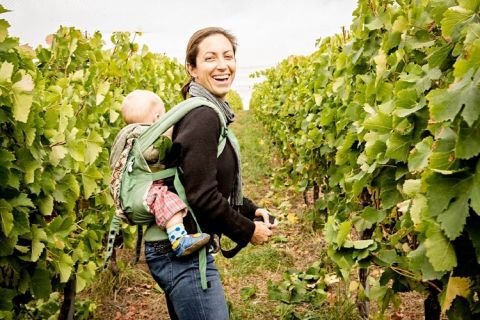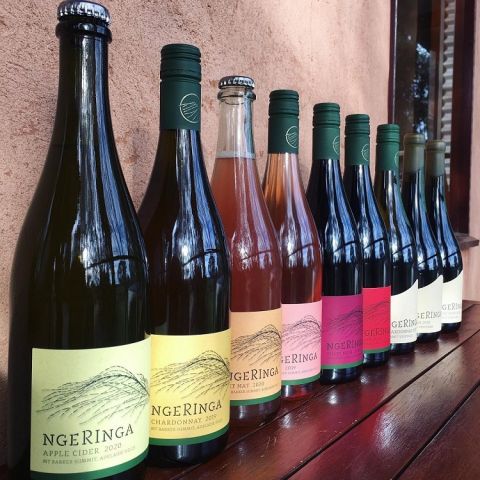Wine must be the son of a place and of those who are part of it. Walking the land, observing it, perceiving its needs and living in close contact with the vineyard, letting it express its best potential are fundamental concepts for understanding the true essence of wine. At Mount Barker Summit, in the beautiful Adelaide Hills, located in the heart of South Australia (a region renowned for producing some of Australia's finest cool climate wines), there is the Ngeringa Winery, one of the pioneers estates of biodynamic agriculture in Australia and a model of excellence for sustainable viticulture in this area of the world.
Erinn Klein, the winemaker and founder of the winery (pictured above) together with his wife Janet, grew up in these lands, in the Jurlique herb farm.
'I grew up with biodynamics on my parents’ Jurlique herb farms. To grow our grapes any other way was unthinkable', says Erinn.
Since he was a child, he observed and learned the sustainable approach of respect for the land transmitted by his parents who applied an agriculture based on Rudolf Steiner's biodynamic and anthroposophic principles. When Erinn and Janet began growing grapes on their family land in the early 2000s, they continued the philosophy of Erinn's parents and over the years they have evolved towards an agricultural system that is both regenerative and self-sustainable by achieving in that period the NASAA biodynamic certification.
Ngeringa has 75 hectares of land including 5 hectares of vineyards, 4 hectares of olives and fruit trees and 2 hectares of mixed vegetables. The rest of the land, for 25% is dedicated to sheep grazing and the remaining one is revegetated with native trees, shrubs, and grasses.
The vineyards
The Summit Vineyard is located on the cooler easterly facing slopes in Mount Barker offerings a view of Lake Alexandrina and the mouth of the mighty Murray River in the distance. The vines reliably receive cool air each evening and the soil is a light sandy loam over clay with areas of red ironstone. Select clones of Chardonnay and Pinot Noir are planted here, along with a few clones of Syrah and Viognier.
The Rufus Vineyard is on the Mount Barker Springs property, on the western slopes, there are small Sangiovese, Nebbiolo, Syrah and Aglianico plants. Rufus is a low yield vineyard but with a very important fruit concentration. Ngeringa receives cool evening sea winds blown in from the southern sea over the Murray River – a wonderful natural aid for develop the freshness and acidity of the wines.
The Iluma Vineyard is located on the northern slope of the Mount Barker summit. The majority of Ngeringa's Syrah and Viognier is planted here, facing west on a lean, textured soil of micaceous schist and ironstone over clay on the Nairne terroir.
The soil
The soil of Ngeringa is full of life, thanks to biodynamic preparations and special soil and foliar brews – rich with seaweed, fish, equisetum/casuarina, stinging nettle, chamomile or yarrow, all made by hand. These preparations are essential immunity boosts to the vines at times of stress or fungal pressure, which strengthen its life force.
Large volumes of biodynamic compost are also made and applied to the soil every year. Milk whey is used instead of majority sulphur-based sprays and a cow-manure based paste is applied pruning wounds in winter.
The revegetation plan
‘To us, sustainability means minimising impact and ensuring the long-term health of our natural environment, both within and beyond Ngeringa,’ Erinn Klein.
Since its foundation, the company has created a long-term revegetation plan. Plots of land have been set aside on all three Ngeringa properties for seed planting in future years.
In summer 2007/08, the first hundreds of native plants were sown in small tubes and since then this has been done every year, sowing out each species according to their natural germination dates. Today, over 1,500 endemic plants have been planted on the winery's properties and another 1,000 will be planted the next winter. This not only favors environmental biodiversity but offsets the estate's CO2 emissions.
The management of fossil fuels and energy requirement
Ngeringa tries to minimize the burning of diesel in the tractors by trying to use them as little as possible during the year. The presence of sheep farming (a natural element that is part of the Ngeringa philosophy) greatly reduces the need to mechanically mow the grass as it is the same animals that control their growth by feeding. In addition, the energy needs are mostly supplied by solar panels placed on the roofs of the estate.
The wines
Ngeringa wines fully express the biodiversity of the terroir and their approach to the practice of biodynamic and regenerative agriculture. The hard work that is done in the vineyard is enhanced with a minimal and delicate vinification making each of their wines Genius Loci (genius of the place).
Here are two wines that best represent the estate's philosophy:
Ngeringa Pinot Noir 2019
A wine that impresses for its aromatic immediacy made of red fruits and freshly picked fresh flowers. In the mouth it is cozy, pulpy and addictive followed by a sapid and fresh note that recalls its expressive transparency.
Ngeringa Syrah 2019
The scents are lively: blackberries, blueberries and raspberries precede slightly spicy notes of black pepper and thyme. In the mouth is vibrant, the tannins are mild and delicate. It is definitely a wine with a lean and energetic physiognomy with a sincere finish.
Both wines are surprising if tasted blind: they seem to be made from the same grape variety, which is the particularity of the terroir expressing all its strength.
All the essence of Ngeringa's philosophy can be found in their wonderful wines, which represent a true excellence of this territory.
‘I hope that every one of our wines tells a little of our approach of biodynamic and regenerative farming practice in that they express the terroir that is alive,’ says Erinn.
In conclusion, for Erinn and Janet, owners of the Ngeringa winery, the true sustainability in an agricultural and wine-growing context means cultivating the land respecting its cycles in order to improve the territory and the environment, contributing to biodiversity. The goal is to leave to future generations a better land than how their predecessors found it.
















